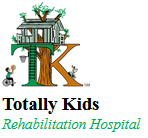Family-Style Dining at Totally Kids Rehabilitation Hospital Provides “Regular Mealtime Atmosphere” for Subacute Patients.
Program Helps Patients Interact With Family, Accept Different Foods, Gain Increased Independence, and Learn Appropriate Mealtime Behavior.
Totally Kids Rehabilitation Hospital has introduced a new family-style dining program that allows children in its subacute unit to participate in a regular mealtime atmosphere and communion with family, staff and other residents.
Our pediatric subacute unit offers respite, long-term care and rehabilitation care for children from newborn to age 21. Most of these patients have experienced catastrophic illnesses or injuries and are dependent on some form of technology. They may have neurologic injuries, congenital birth deficiencies, cardiac or respiratory illness, seizure disorders, or premature birth complications.
“The goal of family-style dining is to integrate typical mealtime interactions between residents while introducing different foods and flavors,” said Pauline Hennessey, vice president of child development/education and rehabilitation services. “Therapy and child-life development work together to introduce multiple flavors and textures of food to stimulate sensory development, increase independence with self-feeding, and promote safe swallowing. We also encourage social, speech, language and motor development with the use of modeling and interaction between the children and caregivers.”
The family-style dining program was developed by Totally Kids’ speech therapists Hailey Meek and Christina Wetzler and is run by Child Development Coordinator Kris Million. As part of the program, patients are encouraged to participate in self-feeding to promote autonomy and independence while issues such as oral aversion, refusal of textures and flavors, and inappropriate mealtime behavior are addressed. The collaboration with families is used to introduce relevant food items that the families can cook at home once the children is discharged. The caregivers, therapists and family are encouraged to bring their own meals to model appropriate feeding behavior.
“There has been great success with increased acceptance with feeding, mealtime routines, independence with self-feeding and social interaction with the introduction of this program at our facility,” says Pauline. “And, of course, a program such as this is totally consistent with our highly personalized approach that allows each child to attain his or her greatest promise and highest possible level of independence – physically, mentally and socially.”
